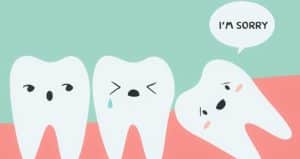7 Tips to Find the Best Dentist for Your Oral Health Needs
June 19, 2025

August 21, 2018
Your very last molars, or wisdom teeth, are the final set to appear in your mouth. While some people’s back molars come in with no problems, the majority of teens and adults don’t have enough room in their mouth to accommodate the extra teeth. Unfortunately, this leads to issues with crowding, and your wisdom teeth may be impacted or unable to grow completely through the gums. Pain, swelling, and cavities near the gum line are just a few symptoms that may lead to a need for removal. Fortunately, most problems that come from wisdom teeth quickly go away once the teeth are removed, and you can use these strategies to prepare for your recovery.
Wisdom teeth removal recovery is affected by your current state of health at the time of the procedure. For this reason, your dentist may recommend that you make lifestyle changes before your appointment. For instance, quitting smoking helps to improve blood flow to the soft tissues of your mouth that promotes faster healing. Make sure to eat a nutritious meal and get a good night’s rest before your appointment so that your body is ready to begin healing immediately after your wisdom teeth are extracted.
Most people feel better within just a couple of days after their wisdom tooth procedure. However, you still need to take precautions as you eat to avoid harming the removal site. Typically, you will need to stick to a liquid or soft food diet during the first 24 hours after your surgery, and you should avoid certain foods until the area is healed such as extremely hot items that could cause a burn near the extraction site.

The truth is that most people have some degree of pain and discomfort after wisdom teeth extractions. Fortunately, there are several things that you can do to ease this part of your wisdom teeth removal recovery. For instance, your dentist may prescribe pain relievers that also reduce the inflammation. Some people often find it helpful to hold a cold pack on the outside of their cheeks to alleviate pain and swelling.
The soft tissues of your mouth heal rather quickly provided that you take care of the extraction site. Once the teeth are removed, your body forms a clot in the hole left behind. This clot is necessary for healing, and you will need to follow special instructions to keep it from getting dislodged. Make sure to abstain from activities that generate suction in your mouth such as smoking, drinking from straws, or vigorously slurping as you eat. In addition to these temporary lifestyle changes, keep an eye out for warning signs of a potential problem with the extraction site such as increasing pain or continued bleeding beyond the first day. This way, you can report the problem to your dentist and get prompt treatment that helps you stay on track for a healthy recovery. At Mountain View Dental, we believe that recovering from dental procedures should always be comfortable. Give us a call today with your questions about wisdom teeth removal so that we can help you make the best decisions for your oral health.
2797 U.S. 89 #201
Pleasant View, UT 84414
| Monday | 8 AM - 5 PM |
|---|---|
| Tuesday | 8 AM - 7 PM |
| Wednesday | 8 AM - 7 PM |
| Thursday | 8 AM - 7 PM |
| Friday | 8 AM - 3 PM |
| Saturday | 8 AM - 12 PM |
| Sunday | Closed |
Proudly accepting new patients from: Pleasant View, North Ogden, Harrisville, Farr West, Marriott-Slaterville, Ogden, Plain City, South Willard, Willard and Perry!
© 2025 | Mountain View Dental | All Rights Reserved | Accessibility | Anti-Discrimination | Healthcare Disclaimer | HIPAA Privacy Policy | Privacy Policy | Terms | XML Sitemap | Sitemap | Site by PDM
